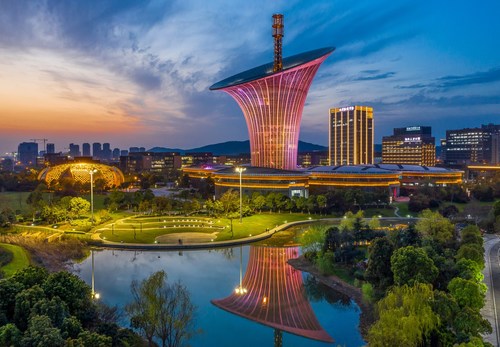Leading German auto parts manufacturer Webasto announced in July that it will build a global research center at the Sino-German International Industrial Park in Wuhan, Hubei province.
Also at the industrial park, which was launched by the governments of both countries, the industry giant founded its largest plant in the world three years ago.

The factory is capable of producing 2,000 sunroofs per day and achieved an output value of 1 billion yuan ($146.9 million) last year.
Zhang Lihua, chairman of Webasto China, said the industrial zone offers enterprises a favorable business climate, thanks to its large talent pool and quality services.
“It only took us about 100 days from the contract signing to the factory opening thanks to the services,” Zhang said.
More than 100 companies, including 58 from abroad, have been launched in the park, forming four major industries of electronic information, auto parts, smart equipment and smart home.
“We set up a special window in our service hall to help enterprises with their problems,” said Yang Yuan, deputy director of Zhashan subdistrict in Caidian district, where the industrial park is located.
“In addition, we have a colleague working as an ‘enterprise assistant’. He maintains close contact with enterprises and offers on-site services if necessary.”
Katsuzawa Takayuki, general manager of the Japan-based company Topre’s Wuhan branch, said the assistant efficiently responds to enterprises’ requests, including those involving registration procedures and labor employment.
“This efficiency has reassured us and allowed us to focus on research and production,” he said.
The industrial park plans to bring in 20 new German-funded companies by 2025 and achieve an industrial output value of 100 billion yuan in the next five years, according to local officials.
Wuhan has worked to expand its trade and economic cooperation with foreign partners in recent years.
Official data showed that the number of foreign-funded companies in Wuhan reached 6,555 in 2021, up 4.58 percent year-on-year. A total of 306 Fortune Global 500 enterprises had invested in the city as of 2020, including 18 from Germany.
As one of the key projects for China–France cooperation, the Sino-French Wuhan Ecological Demonstration City, initiated in 2014, is progressing smoothly.
The eco-city that covers 39 square kilometers in Caidian district aims to facilitate bilateral exchanges of experience and technologies in green urbanization while promoting cooperation in culture and tourism, local officials said.
During the 14th Five-Year Plan period (2021-25), the city plans to implement 118 projects involving industries, transportation, environmental protection and public services, according to the eco-city’s administrative committee.
All initial construction projects will be completed by 2025 and the city will have a residential capacity of housing 120,000 people, the committee said.
Wuhan has also participated in the Belt and Road Initiative by operating China–Europe freight trains.
China–Europe freight trains (Wuhan) has launched 30 routes since its opening in 2012, linking the city with 76 cities in 34 nations in Eurasia.
The freight train services not only offer local enterprises an international trading channel but promote the foreign trade of neighboring cities such as Yichang and Xiangyang, local officials said.
Wuhan welcomed a total of 240 China-Europe freight train trips in the first half of 2022, a year-on-year increase of 62 percent.
Source:https://www.prnewswire.com/




















Add Comment